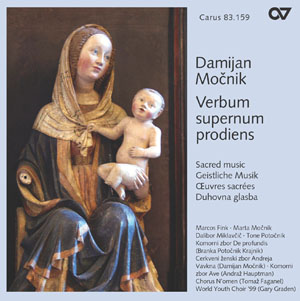
Verbum supernum prodiens
Contents
-
Composer
Damijan Mocnik
| 1967
-
Preface writer
Tomaz Faganel
-
Ensemble
World Youth choir '99
-
Ensemble
Kammerchor De profundis
-
Ensemble
Frauenchor Andrej Vavken
-
Ensemble
Kammerchor Ave
-
Ensemble
Chorus N'omen
-
Conductor
Damijan Mocnik
| 1967
-
Conductor
Gary Graden
| 1955Gary Graden was born in the USA and studied at Clark University, the Hartt School of Music, the Aspen Summer Music Festival, and with Eric Ericson at the Royal College of Music in Stockholm. He is a former member and tenor soloist with the Eric Ericson Chamber Choir. Graden is presently the director of choral music in the Stockholm cathedral and S:t Jacobs Church in Stockholm. With S:t Jacobs Chamber Choir he has won grand prizes and first prizes in many of Europe’s most prestigious competitions, including the European Choral Grand Prix. He has also participated in a wide array of national and international festivals and is in demand as conductor, teacher and adjudicator throughout the world. His work as conductor and singer is documented on many CD and radio recordings. Gary Graden was elected Sweden’s Choral Conductor of the Year in 2005. In 2009 he and his choir were awarded the Guidoneum Award from the Fondazione Guido D’Arezzo in Italy. Personal details
-
Conductor
Branka Protocnik Krajnik
-
Conductor
Andraz Hauptman
-
Conductor
Tomaz Faganel
-
Soloist - soprano
Marta Mocnik
-
Soloist - baritone
Marcos Fink
-
Soloist - organ
Dalibor Miklavcic
-
Soloist - organ
Tone Potocnik
Reviews
Damijan Mocnik: Verbum supernum prodiens
Damijan Mocnik: Verbum supernum prodiens
Still in his mid-thirties, Slovenian-born Damijan Mocnik, who is also a choir conductor, has a sizeable output of choral music to his credit, of which the present release provides a fairly comprehensive survey. These settings draw on a variety of sources, Latin, Slovenian (Pro?nja, Blagri [The Beatitudes] and Kralj) and Greek (Evhe). All of them display Mocnik’s expertise in choral writing gained from his conducting activity. The music, as a whole, is fairly straightforward and directly communicative, although I suspect that it must not always be easy to sing; and is mostly modally inflected with further influences from orthodox chant and folk music, but never crudely so. The folk influence is rather more evident through allusions than direct quotes.
Most pieces here are fairly short, setting various sacred texts either for mixed chorus or female voices, although some of them actually exist in different versions. Two pieces, however, stand out, if only for their rather unusual setting: Benedictus Dominus (for solo baritone) and Magnificat (for solo soprano), both magnificently sung here.
At twenty minutes, Missa in organi benedictione of 1999 is by far the most substantial work here, and a major Mass setting. It appropriately enough has an important, often demanding organ part. The setting, as a whole, is in turn simple and homophonic, contrapuntal and fiercely energetic, moving along with conviction and passion.
As can be derived from the details above, these recordings by several choirs have been made in different venues in or nearby Ljubljana, but the recorded sound is quite fine throughout, whereas all performances are superbly committed and technically assured.
In short, here is a composer new to me of whom I would definitely like to hear more, and particularly some (or all) of his choral-orchestral works which Carus might be persuaded to record soon. This release is well worth looking for.
Hubert Culot
Quelle: Classical Music Web
Der Slowene Damijan Mocnik (Jahrgang 1967) studierte Komposition und Chorleitung (u.a. bei Eric Ericson) und ist als Lehrer und Chorleiter in Ljubljana tätig. Zahlreiche Preise und Auszeichnungen machen ihn zu einem der wichtigsten slowenischen Komponisten der jüngeren Generation. Für seine musikalische Sprache lässt er sich einerseits von den rhythmischen und melodischen Elementen der von ihm ausgewählten Texte inspirieren, andererseits von archaischen Musikformen wie der Gregorianik oder der slowenischen Volksmusik. Diese verarbeitet er gekonnt in eine eigene moderne und dabei doch unmittelbar ansprechende polyphone und polytonale Musik.
Quelle: Note 1 Nov/ Dez 2003
[ ] La bonne qualité des ch?urs et de la direction achève de faire de ce disque de musique contemporaine l'un des plus remarquables du moment.
Michael Sebaoun
Quelle: Classica 3/06
Frequent questions about this work
 There are no questions and answers available so far or you were unable to find an answer to your specific question about this work? Then click here and send your specific questions to our Customer Services!
There are no questions and answers available so far or you were unable to find an answer to your specific question about this work? Then click here and send your specific questions to our Customer Services!



